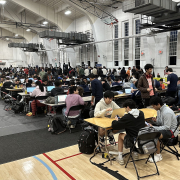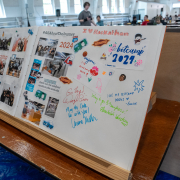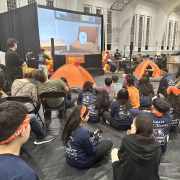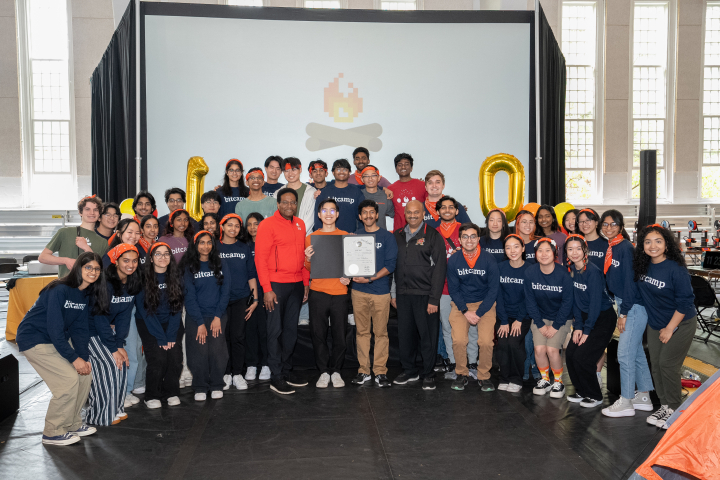The University of Maryland Hosts the 10th Annual Bitcamp
The University of Maryland celebrated the 10th anniversary of Bitcamp, one of the East Coast's largest collegiate hackathons, from April 19-21, 2024, at the Reckord Armory. High school students and undergraduates participated in the 36-hour event, developing innovative software and hardware solutions. The annual hackathon draws ambitious student programmers, designers and innovators from across the region. More than 2,000 students registered, including 200 participants from outside UMD.
 This year, Bitcamp offered a variety of tracks aligned with current technology trends, including machine learning, quantum computing, cybersecurity and app development. Highlights included Colorwar, a live design competition, and Design Den, where experts provided guidance on user interface and user experience.
This year, Bitcamp offered a variety of tracks aligned with current technology trends, including machine learning, quantum computing, cybersecurity and app development. Highlights included Colorwar, a live design competition, and Design Den, where experts provided guidance on user interface and user experience.
At the event, students embraced the spirit of innovation and walked away with projects and shared experiences that promised a lasting impact. Among them was Neil Hajela, a senior computer science major at UMD.
"Last year, we developed a hack called Tweet Watch," Hajela said. "It involved several Python frameworks and was quite technical. We built on that this year by learning additional front-end frameworks such as React and Vue. Previously, we concentrated on back-end functionality, but this year, we focused on creating a visually appealing project that enhances its aesthetics."
Hajela finds the 36-hour stretch at Bitcamp to be a unique experience.
“It is an amazing collaborative experience working with other people throughout the night,” Hajela shared. “My team and I pulled an all-nighter to complete our work last time. Many people work hard on their projects and are willing to stay up all night like we did to make something great.”
Bitcamp attracted significant sponsorship from industry and academia, with support from UMD’s Department of Computer Science, Bloomberg, Fannie Mae, Capital One and Geico. Cloudforce co-hosted the event, highlighting the role of cloud technologies in computing. These partnerships provided financial support and expert resources, enhancing the experience for participants.
Dakota Sams, a junior from the Baltimore Polytechnic Institute, attended Bitcamp for the first time and embraced the event's supportive environment.
"Bitcamp is a creative atmosphere of innovation and collaboration," Sams said. “Everyone was so supportive and came together to share their ideas. As we worked on our projects, we developed cool concepts. I have been pursuing software engineering, and being at Bitcamp and seeing how I could build something that positively affects people's lives will stick with me."
The success of Bitcamp depends significantly on the contributions of volunteers and mentors who guide participants through the development process. These individuals devote their time to organizing the event, helping teams overcome technical challenges and achieve their project goals.
Esha Singhai, a sophomore computer science major and Bitcamp organizer, underscored the importance of supporting young hackers.
"I'm excited to organize Bitcamp because I started attending during high school, admiring the organizers, the hackers and all the cool projects they build," Singhai said. "I'm thankful to facilitate the same experience for first-time hackers and hope to make it an unforgettable experience that may inspire them to return to hack or even volunteer. Bitcamp represents a community of creative, amazing individuals who apply what they learn in class to build something cool and connect with their community, so we also try to show that we are here for them."
 As the hackathon concluded, sponsors handed out awards to participants who showcased exceptional creativity and technical skills. The awards highlighted innovation in several key areas, including Best Use of AI/ML Innovation for the Francis Scott Key Bridge Recovery Effort, Most Philanthropic Hack, Best Use of APIs Related to Housing/Climate Change and Best Financial Hack.
As the hackathon concluded, sponsors handed out awards to participants who showcased exceptional creativity and technical skills. The awards highlighted innovation in several key areas, including Best Use of AI/ML Innovation for the Francis Scott Key Bridge Recovery Effort, Most Philanthropic Hack, Best Use of APIs Related to Housing/Climate Change and Best Financial Hack.
Looking ahead, Singhai sees the event growing into more than just a conventional hackathon for students, potentially fostering a broader platform.
"In the future, I would love to see accelerators get involved," Singhai said. "I know many students are creating innovative projects that can make a huge difference in society. I would love to see more students adopt an entrepreneurial mindset, develop their hacks into startups and take them further beyond Bitcamp."
—Story by Samuel Malede Zewdu, CS Communications
The Department welcomes comments, suggestions and corrections. Send email to editor [-at-] cs [dot] umd [dot] edu.
